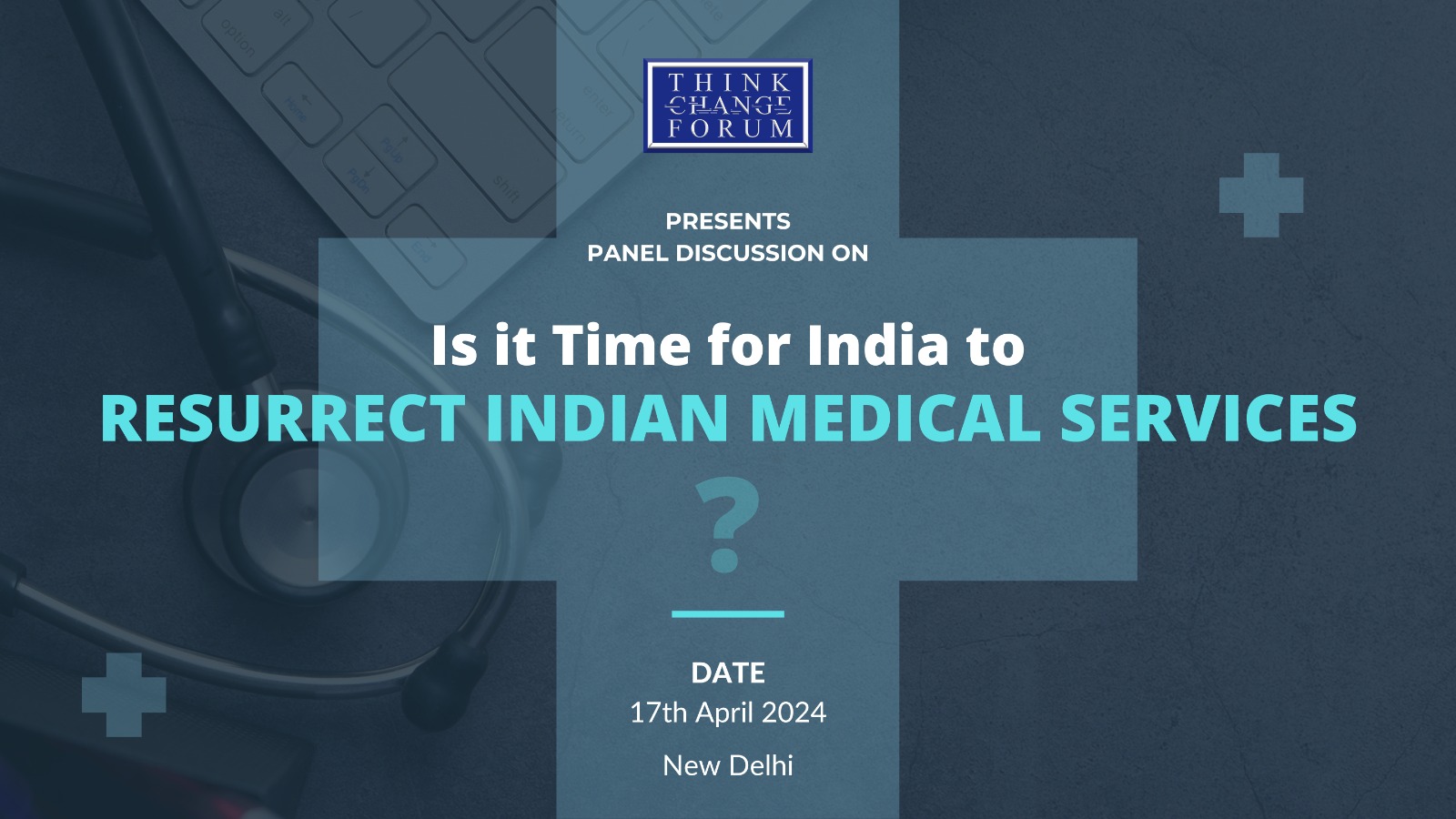17th April 2024, New Delhi
A distinguished panel at the event:
- Sharad Agarwal – National President, Indian Medical Association (IMA)
- Varuna Pathak - Former Professor of Gynecology & Obstetrics, Gandhi Medical College, Bhopal
- Sita Naik - Professor and Head of the Department of Clinical Immunology, Sanjay Gandhi Postgraduate Institute of Medical Sciences
- Vidur Jyoti – Senior Director & Head, Minimal Access & General Surgery, Max Hospital, Gurgaon
- Rajesh Gupta - Additional Director, Pulmonology & Critical Care, Fortis Healthcare, Noida
- SL Vig - Assistant Professor Community Medicine - ESIC Medical College Faridabad.
Thinks Change Forum organized an event titled ‘ Is it time for India to resurrect Indian Medical Services’. At the event a lot of key public health related issues were discussed by the eminent panellists.
The panel at the event was clear in its opinion about reintroducing Indian Medical Services as an equivalent of Indian Administrative Services so that it can cater to the health care requirements of India effectively.
The panel believed that the reintroduction of the Indian Medical Services (IMS) was vital to address the wide gap between health care demand and delivery. The panel said IMS can play a pivotal role in achieving health care objectives.
The panel at the event said that IMS will bring the sheen back and more importantly the trust back in the public health sector services which it has lost to the private health sector.
The panel believed that the reintroduction of IMS would result in superior health care outcomes through better management of facilities and processes through IMS.
The panel at the event highlighted the fact that with IMS in control specialists and not generalists will take care of the health care operations.
The panel further said that this change over to the IMS specialists will ensure reduced health crises, reduction in tertiary cases, vast improvement in preventive healthcare at primary levels. The panel believed that this change over to the IMS specialists will enable seamless coordination between states and centres health care policy making.
The panel at the event observed that IMS was present during the British era but was discontinued after India’s independence. The panellists further observed that the current government has made commendable efforts in healthcare and has implemented impactful schemes like Ayushman Bharat. However, the panel said that there is still a huge gap which requires systemic changes this huge gap can be filled by bringing back IMS.
The esteemed panel at the event proposed a ‘5-Point Agenda’ for bringing IMS back in India:
Point no1 of the agenda was about excessive reliance on private health care sector as public health care sector had lost the trust of the people through better specialists’ operations IMS will bring back the trust of the people in the public health care system. Dr Rajesh Gupta an eminent panellist at the event observed 60% of inpatient admissions (IPDs) and 80% of outpatient visits (OPDs) are occurring in the private health care centres. Another esteemed panellist Dr Varuna Pathak said that most of the time, we observe systemic failures in healthcare not because of healthcare professionals but because of the administrator who is a generalist bureaucrat. Dr Vidur Jyoti a noted panellist observed that during the COVID-19 pandemic, the challenges and bottlenecks encountered were primarily attributed to bureaucratic hurdles rather than any lack of commitment from healthcare professionals.
Point no2 of the agenda emphasized on challenges in staffing the public healthcare system with skilled doctors as there was lack of incentives for these highly educated professionals in terms of working under generalist administrators this has resulted in a brain drain, so there is an urgent need to reestablish IMS to stop this brain drain of health professionals. Dr Sharad Kr Agarwal an eminent panellist observed that IMS holds the promise of enhancing quality health services through induction of skilled doctors and addressing the persistent doctor shortage, especially in rural areas. He further said that these health professionals under IMS should be given incentives equivalent to IAS or IPS officers. Dr S.L. Vig a noted panellist at the event said for fresh medical graduates, IMS can serve as a promising career path, commencing with postings at district or block levels.
Point no3 of the agenda emphasized on the necessity for superior health outcomes for the citizens with better managed facilities and processes, which will happen only when generalists will no longer be managing things. The specialists inducted through Integrated Health Leadership under IMS can ensure professional health care services for the people in a much better way. Dr. Sharad Agarwal an esteemed panellist at the event observed reinstatement of IMS requires a unique approach distinct from other fields wherein medical professionals should balance both clinical expertise and administrative skills.
Point no 4 of the agenda focused on an urgent need to avert growing incidences of health crises and reduction in tertiary cases which can happen by improving preventive healthcare and delivery at primary healthcare levels through an effective IMS. Dr Vidur Jyoti an eminent panellist at the event believed we are essentially moving into disease management and are neglecting health management which has put immense pressure on the tertiary system. Dr SL Vig a noted panellist said along with primary care we need to offer primordial prevention and primary prevention also.
Point no 5 of the agenda highlights that IMS will be able to enable seamless coordination and cooperation between the central and state health departments, for improved national healthcare policies of the country. Dr S.L. Vig elaborated on this point he said health should be a state subject while IMS cadre can serve as a force multiplier to implement central healthcare policies and schemes, customizing them to meet the unique healthcare requirements at the state and community levels.
Overall all the eminent panellists at the event were very unanimous in their views about the reestablishment of Indian Medical Services (IMS) in order to substantially improve the public health sector of the nation.

